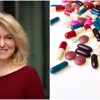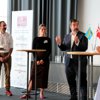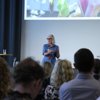Fritextsökning
Artiklar per år
Innehållstyper
-

Rise and Scantox cease conducting animal testing in Stockholm
Access to in vivo toxicology services is significantly decreasing in the Stockholm area as Rise shuts down animal testing and Scantox reorganizes. ”The costs are high, and demand is weak”, says the division manager at Rise to Life Science Sweden.
-

Hypothesis testing versus conspiracy theory
"How do you know what is a conspiracy theory and what is a reasonable, scientifically based conclusion?" In a column, Ingrid Lönnstedt reflects on this question.
-

Hajpat genterapibolag skär ner med 65 procent
Det en gång så omsusade genterapibolaget Editas Medicine säger upp 65 procent av sin personal – omkring 180 medarbetare – till följd av ett beslut om att avbryta bolagets projekt inom sickelcellssjukdom.
-

Lilly recruits top Swedish researcher in Alzheimer´s
One of Sweden's leading Alzheimer's researchers, Oskar Hansson, has been recruited by pharma giant Eli Lilly and will be moving to the USA.
-

Large study on milk: Risky for women but not for men
The risk of ischemic heart disease (IHD) and acute myocardial infarction (MI) increased for women with milk intake levels higher than 2 glasses per day, while no such association was found in men, according to a new large Swedish study.
-

“Research is always a lot of failures and a few successes”
Gene therapies open up fantastic possibilities, but they are also extremely expensive to produce. Genenova aims to change that and make the treatments accessible to more people. “Our overall ambition is to reduce costs a hundredfold”, says professor Johan Rockberg at KTH Royal Institute of Technology in Stockholm.
-

Orbán's extended arm becomes health commissioner in the EU
Hungarian Olivér Várhelyi may soon become the most influential official for the healthcare and pharmaceutical industry in the EU. Várhelyi, who is close to Hungarian prime minister Viktor Orbán, is seen as a controversial figure due to his opposition to abortion and for calling EU members ”idiots.”
-

Drug development booms in Medicon Valley
When it comes to developing new medicines, the Öresund region is one of the top performers in the EU. Companies working on commission for pharmaceutical companies are highlighted as a success factor. “Everyone has heard of Novo Nordisk, but these companies are unknown to people outside the industry despite being the golden vein of the life science sector,” says Anette Steenberg, CEO of the cluster organisation MVA.
-

Anna Törner: ”Mom, do you think you’ll ever get married again?”
”I realize I’m slowly descending into that familiar statistical rabbit hole, where life’s biggest uncertainties are reduced to point estimates and confidence intervals”, Anna Törner writes in a column.
-

“We should avoid surgery if we can”
Since February this year, she has been Scientific Director Life Science at the Karolinska Institutet. Life Science Sweden met Anna Martling for a talk about role models, surgery and Sweden’s strengths and weaknesses in medical research.
-

What will be the next big hype after obesity? – An expert panel highlighted their top picks
What will be the next big trend in life science? Everything from Alzheimer’s, Crispr and Omics were highlighted when the issue was debated at this year’s major life science event in Lund.
-

Artificial intelligence in radiology – “Risk prediction is very exciting”
A growing number of solutions based on artificial intelligence are being developed and used in healthcare. According to Sophia Zackrisson, Professor of Radiology at Lund University, radiology is a field that is well suited to the technology.
-

Anna Törner: Yes, I Am Sick, But Not Weak
”People often say that someone who is ill only has one wish—to get better. But I think that is not true. Someone who is ill also longs to be understood, to be respected, to not have their identity overshadowed by their condition”, writes Anna Törner in a column.
-

The investor: “The major common diseases are hot again”
She has previously been voted Investor of the Year and will now be moderating The Future of Swedish & Danish Life Science congress. We check the temperature of the industry with Nina Rawal from Trill Impact Advisory.
-

Thumbs down for lecanemab in the EU – “Very surprised”
The Azheimer's drug lecanemab has received a negative assessment from the European Medicines Agency’s Committee for Medicinal Products for Human Use (CHMP), according to an announcement made by the Agency last week. Bioarctic’s CEO Gunilla Osswald describes the reactions after the announcement as a surprise and disappointment.
-

Innovative start-up helps doctors, scientists and industry balance coagulation risks
For many doctors caring for seriously ill patients, for example, in stroke units and cancer wards, maintaining the life-saving balance between bleeding and thrombosis is an ongoing challenge. In the late 1980s, scientists at Maastricht University in the Netherlands developed an innovative method, the thrombin generation assay (TGA), which provides a complete overview of a physiological process crucial for maintaining normal haemostasis.
-

“Conducting research at universities is becoming more and more like working at a research hotel”
The government wants Swedish research to focus on excellence and innovation, but can the two be combined? Life Science Sweden talks to Anna Falk, a professor at Lund University, about research policy, the constant hunt for funding in academia and what constitutes ‘fine research’.
-

Samuel Lagercrantz: “Companies that do this successfully will take the lead”
The development of new medicines and medical technologies should not focus too narrowly on prolonging life. It is equally important to develop treatments that relieve pain or eliminate painful symptoms, writes Samuel Lagercrantz in an editorial.
-

Carl Borrebaeck – professor and serial entrepreneur with a taste for speed
Award-winning cancer researcher, the founder of many listed companies, and constantly in the academic and commercial spotlight for decades. However, Carl Borrebaeck, Professor of Immunotechnology at Lund, is not yet satisfied. “We have a new, potentially super exciting project in the pipeline,” he says.
-

List: The coolest names in biotech
Hairy beasts, volcanic material and space strolling stand out on a US list of the best biotech company names, and on a list of the coolest names for pharmaceuticals, a Swedish, or at least Swedish-British, drug came out on top.
-

Nocebo – the evil twin that makes you feel worse
The placebo effect is well known in healthcare, but not so its opposite: nocebo. “The effect is small, but it can have major repercussions,” says Uppsala researcher Charlotte Blease, co-author of a book on the phenomenon.
-

The Covid pandemic accelerated the development of cancer vaccine
The Covid pandemic gave a major boost to the vaccine field. The Danish biotech company Expres2ion Biotechnologies, which is developing a vaccine against breast cancer, testifies to this.
-

Assignment: Facilitate the retention of foreign researchers
A newly appointed public inquiry is to develop measures to make attracting and retaining foreign doctoral students and researchers in Sweden easier.
-

The life science strategy – what the industry wants
The process of updating the national life science strategy has begun at the government’s life science office. According to industry stakeholders, Sweden’s competitiveness, the accessibility of health data and the integration of innovation in healthcare are some of the points that are essential to review.